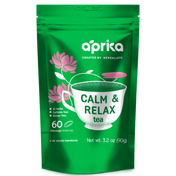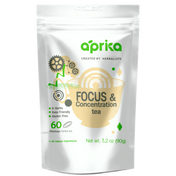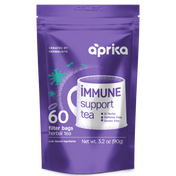Digestive Health
Gentle on the stomach and easy on the senses, discover our curated collection of tea made to support digestion, naturally.
100% Pure Peppermint Herbal Tea, 60 Bags
Cool, refreshing tea for digestion & clarity
Regular price $14.99Unit price /Unavailable100% Pure Chamomile Herbal Tea, 60 Bags
A single-ingredient tea for pure relaxation
Sale price $12.74 Regular price $14.99Unit price /Unavailable
What Makes Hojicha a Stomach-Friendly Green Tea
Hojicha is a Japanese green tea that's been roasted over high heat, giving it a distinctive earthy aroma and a smooth, toasty flavour. But beyond its comforting taste, Hojicha is also known for being incredibly gentle on the digestive system. The roasting process lowers its caffeine and catechin content, making it less astringent than other green teas. That means it's much gentler on the stomach, less likely to trigger acid reflux, and easier to drink after meals. For those who find traditional green teas sharp or stimulating, Hojicha offers a mellow, soothing alternative that still carries the soothing qualities of tea. Because it's so low in caffeine, it won't interfere with rest or relaxation, making it a good choice for a cup of tea after dinner or in the evening.
Chamomile Tea and Digestion: What Makes It So Effective
Chamomile tea has long been used as a natural remedy for digestive discomfort, and its reputation is well-earned. Known for its calming, slightly sweet floral taste, chamomile contains natural compounds, like apigenin and bisabolol, that help relax the muscles of the gastrointestinal tract. This can ease issues like bloating, gas, cramping, or mild indigestion, especially after a heavy or late meal. Its anti-inflammatory properties also play a role, helping soothe the gut lining and reduce discomfort caused by irritation or sensitivity.
Chamomile's calming nature also has an impact on the nervous system. Since stress is often tied to digestive issues, having chamomile can support the body both physically and mentally. Whether you're dealing with an unsettled stomach or simply looking for something soothing to unwind, chamomile tea offers a warm, easy ritual to help the body settle.
Is Peppermint Tea Good for Digestion? Here's What It Does
Peppermint tea is widely valued for its natural ability to support digestion and relieve discomfort. Made from peppermint leaves, this herbal tea contains menthol, a compound that helps relax the muscles in the digestive tract. It's particularly helpful after a heavy meal or during indigestion, making it a go-to herbal tea for those looking for soothing relief.
Peppermint tea's cooling, refreshing flavour brings cooling relief and lightness, which many find especially comforting after eating. Because it's naturally caffeine-free, peppermint tea can be enjoyed day or night, offering a soothing and effective way to calm the digestive system without overstimulating it.
Tea for Digestion: A Simple Way to Feel Better After Eating
Tea has long been a trusted companion after meals, offering a natural, uncomplicated way to support digestion. The Houjicha green tea in this selection is sourced from Japan and is USDA organic, a mark of quality that ensures you're consuming something clean, safe, and deeply calming. The herbal teas included here are just as thoughtful. They're sourced from the Carpathian Mountains, and these teas are grown, harvested, and prepared by skilled herbalists who are guided by generations of knowledge to craft blends that are both effective and gentle.
There are no added flavours or unnecessary ingredients, just carefully selected plants, nurtured by tradition and brought to you in their purest form. For ease of use, these herbal teas come in convenient tea bags, ideal for daily rituals or moments when you need quick, reliable support. Whether you're looking to ease discomfort, reduce bloating, or simply wind down after a meal, these teas offer a range of health benefits.
Frequently Asked Questions
Which herbal teas are best for digestion?
Which herbal teas are best for digestion?
Several herbal teas are known for their digestive benefits and supporting gut health, due to their natural ability to soothe the stomach and reduce discomfort:
- Peppermint tea is one of the most popular choices. It contains menthol, which helps relax the muscles of the digestive tract and can ease bloating, gas, and cramping.
- Chamomile tea is another great option. It has calming, anti-inflammatory properties that can help reduce mild indigestion and settle the stomach, especially after heavy meals.
- Fennel tea is often used to relieve gas and support smoother digestion. Fennel seed tea has a mild, slightly sweet flavour and can help reduce bloating.
- Ginger tea is comforting and stimulating, known to aid digestion by supporting movement in the digestive tract and easing nausea.
- Lemon balm tea has a gentle, citrusy taste and is traditionally used to calm both the stomach and the nervous system, which are often closely linked.
These herbal teas are all naturally caffeine-free and can be enjoyed by tea lovers regularly, especially after meals or in the evening, to help support your digestive system.
Are herbal teas caffeine-free?
Are herbal teas caffeine-free?
Yes, most herbal teas are naturally caffeine-free. Unlike traditional teas made from the Camellia sinensis plant (like black, green, or oolong teas), herbal teas are made from herbs, flowers, roots, or seeds, such as peppermint, chamomile, ginger, or fennel, which do not contain caffeine. This makes them a great option for people looking to avoid stimulation, especially in the evening or before bed. Just be sure to check the label, as some blends may include added ingredients that contain caffeine.
What does Hojicha tea taste like?
What does Hojicha tea taste like?
Hojicha tea has a warm, roasted flavor with a gentle, nutty sweetness and a smooth, mellow finish. Unlike traditional green teas, its roasting process gives it a toasty, slightly caramel-like aroma without the grassy or bitter notes, making it easy and comforting to drink.
How long should I steep herbal tea for digestion?
How long should I steep herbal tea for digestion?
For optimal digestive benefits, herbal teas should generally be steeped for 5 to 10 minutes. This longer steeping time allows the herbs to fully release their natural compounds, which help soothe the digestive system and ease discomfort. However, if you prefer a milder flavor, you can steep for a shorter time, just keep in mind that the tea may be less potent. Using fresh, quality herbs and hot water ensures you get the most from each cup. To fully get the best of your teas, you can head to our blog on How to Brew Herbal Tea for Maximum Benefits.
Additional Collection Information
Additional Collection Information
More About Teas for Digestive Health
This collection of teas is made of curated products that support your digestive health and provide a soothing, reliable experience after meals. The Hojicha in this collection is a Japanese green tea roasted over high heat, giving it a smooth, toasty flavor and an earthy aroma. The roasting process reduces its caffeine and catechin content, making it gentle on the stomach, easy to digest, and less likely to cause acid reflux. Its mellow taste offers a calming alternative for those who find traditional green teas sharp or stimulating and makes for a comforting cup in the evening or after meals.
Chamomile tea is known for its natural, soothing properties. Its slightly sweet, floral flavor comes with compounds that relax the muscles of the digestive tract, easing bloating, cramping, gas, or mild indigestion. Anti-inflammatory properties help calm the gut lining, while its gentle, calming effect also supports the nervous system, helping the body settle after heavy meals or stressful days.
In addition to its cooling and relaxing properties, peppermint has many other benefits. The menthol in the leaves helps relax digestive muscles, easing discomfort and leaving a light, soothing feeling after eating. Its crisp flavor is comforting, and being naturally caffeine-free, it fits perfectly into any part of the day without overstimulation.
Every tea in this collection is carefully sourced for purity and quality. Hojicha comes from Japan and is USDA organic certified, and the herbal teas are grown and prepared by skilled herbalists in the Carpathian Mountains using traditional methods. There are no added flavors or unnecessary ingredients, and the herbal teas come in convenient tea bags that make daily use simple. This collection offers an approachable, practical way to support digestion, reduce discomfort, and enjoy a calm, restorative tea experience.














